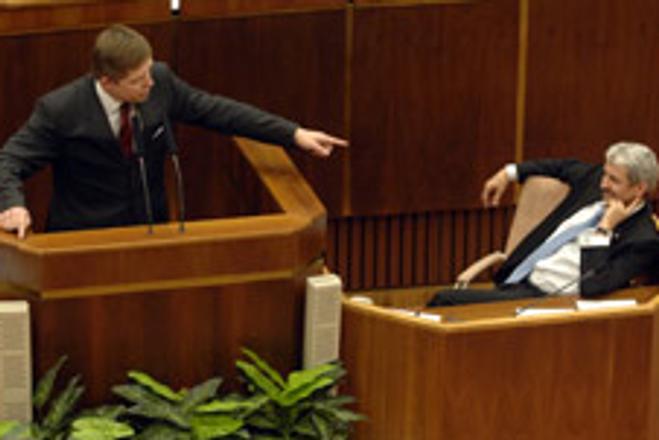THE ORGANISATION for Security and Cooperation in Europe (OSCE) has joined the choir of critics of a recent revision to Slovakia's press code. OSCE Representative on Freedom of the Media Miklós Haraszti has asked the Slovak government to withdraw the bill from parliament and said that his office was ready to provide recommendations on how to improve it. Slovak government officials were quick to dismiss the OSCE criticism, saying the organisation was wrongly informed about the bill, which the cabinet passed on January 9. Culture Minister Marek Maďarič, whose ministry has nurtured the draft code since its inception, said that the legislation isn't moving.
"The present draft contains sections that would severely restrict editorial autonomy, and would thereby go against Slovakia's international commitments to protect freedom of the press," Haraszti wrote in a letter to Slovak Foreign Affairs Minister Ján Kubiš.
Haraszti was critical of the articles that give the government the power to impose sanctions on publishers and grant the right of reply in a way that intrudes on editorial autonomy.
The bill earned criticism, according to Haraszti, for granting the Culture Ministry the authority to decide if any "information was published in ways that belittle, excuse, or approve of the promotion of a long list of socially harmful behaviour."
The OSCE also tagged the provision that obliges media to publish a response from any person or legal entity "if they were to find that a published 'fact statement' negatively affected their honour or dignity, regardless of whether the 'fact statement' was true or not."
Maďarič dismissed the criticism and said the legislation does not limit editorial autonomy. He also indirectly questioned the authority of Haraszti to criticise the draft.
"An OSCE representative, and I do not even think that he's a leading one, has written a letter to the Foreign Affairs Minister," Maďarič responded, as quoted by SITA news wire. "Of course, we will react."
Speaker of Parliament Pavol Paška, a nominee of Robet Fico's ruling Smer party, said that the OSCE's attitude comes from being misinformed. Paška also said that this was not the first time a European Union institution had overreacted based on incorrect information, the Sme daily reported.
Maďarič also defended the draft, suggesting that one of the provisions the OSCE is critical of is included in the current press code. He said he does not understand why the OSCE did not protest when the previous government inserted the provisions allowing the Culture Ministry to fine publishers for downplaying or approving of war, inhumane treatment, or drug abuse, the SITA news wire wrote.
The Slovak culture minister also stood up for the provision on the right for response, suggesting that other European Union countries acknowledge this right.
Slovak publishers, experts and journalists are critical of the bill.
Miloš Nemeček, chair of the Association of Periodical Press Publishers (ZDVP), told The Slovak Spectator that the spirit of the bill has brought more unnecessary sanctions than usual. He also marked the right of reply and fines against publishers as the two provisions that could hurt the media environment.
Publishers fear that newspapers will be flooded with statements from people who feel wronged.
"We do not think the right of reply is disturbing at all; we consider it a standard instrument," Nemeček said, noting that the Council of Europe has a similar resolution. "But not if the information is true. Simply put, truthful information is just that: truthful information. You can add something to it, but whether that's right to do is very questionable."
Anyone who's criticised thinks the criticism injures their honour and reputation, he said.
"As all opinions have a factual component, this provision in reality introduces an obligation to publish responses to opinions," Haraszti wrote in his letter. "That would grant politicians limitless and arbitrary access to publicity over the heads of editors."
According to Haraszti, in a pluralistic democracy, laws can not be used to boost 'objectivity' in private media outlets. The Government must not aim to homogenize opinion content or enforce editorial impartiality, he concluded.
With files from Ľuba Lesná



 Prime Minister Robert Fico and his predecessor Mikuláš Dzurinda clashed during the late night parliamentary session. Fico accused Dzurinda and the opposition of using the parliamentary session for self-promotion. (source: ČTK)
Prime Minister Robert Fico and his predecessor Mikuláš Dzurinda clashed during the late night parliamentary session. Fico accused Dzurinda and the opposition of using the parliamentary session for self-promotion. (source: ČTK)